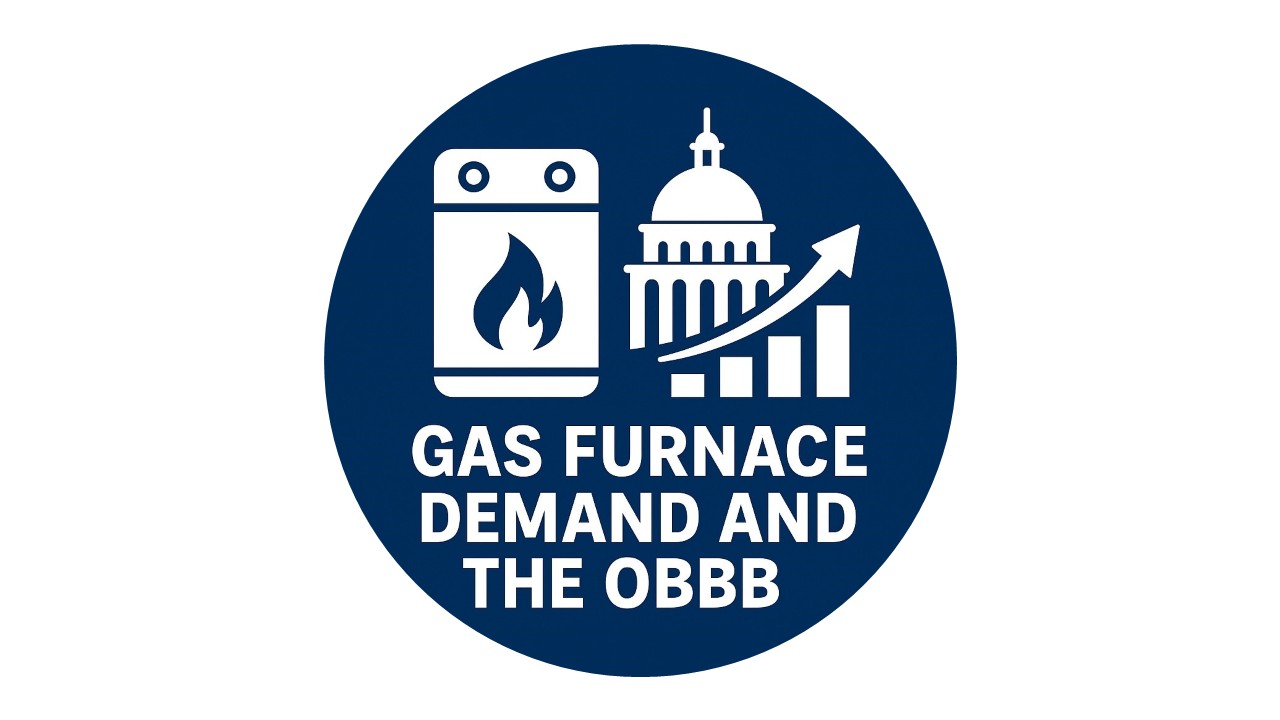
Unless you’ve been trapped under something heavy for the past three months, you’ve probably heard of President Trump’s “One Big Beautiful Bill” (OBBB) budget proposal. Regardless of your political leanings, passage (or not) of the OBBB will affect the trajectory of gas furnace shipments in 2025 and beyond.
April and year-to-date (YTD) 2025 data from AHRI confirm robust growth in gas furnace shipments, with clear regional and vertical trends emerging when compared directly to 2024 figures. This article looks at the numbers through April, considers market drivers in the context of broader housing and channel shifts, and outlines what manufacturers and distributors should prepare for next.
Year-Over-Year Shipment Growth: 2024 vs. 2025
Each month in 2025 has shown double-digit growth over 2024:
| Month | 2024 Shipments | 2025 Shipments | YoY Change |
| January | 226,312 | 271,380 | +19.9% |
| February | 211,012 | 259,405 | +22.9% |
| March | 245,601 | 298,639 | +21.6% |
| April | 222,359 | 264,259 | +18.8% |
| YTD | 905,284 | 1,093,683 | +20.8% |
Regional Growth Patterns
- Sun Belt Metros (Texas, Florida, Arizona, Carolinas): These states are leading the nation in new home permits and population growth, according to housing permit and migration data from Zonda and the U.S. Census Bureau, fueling both new construction and replacement demand.
- Disaster-Rebuild Markets: States like Louisiana, Kentucky, and California, recently impacted by hurricanes, floods, or wildfires, have seen short-term surges in furnace shipments as rebuilding accelerates.
- Midwest and Northeast Urban Hubs: Cities with older housing stock, such as Chicago and New York, continue to drive steady replacement and renovation demand, even as new construction lags.
- Emerging Multifamily and Renovation Markets: Multifamily and renovation markets, especially in the Southeast and Midwest, are showing strong activity, backed by forecasts like LIRA, Fannie Mae, and Zonda’s multifamily pipeline analysis.
Vertical Market Trends
- New Construction: Despite a national slowdown in single-family housing starts, Zonda’s latest Housing Market Update confirms resilience in Sun Belt metros, with new construction continuing to drive furnace shipments in these areas.
- Renovation and Replacement: Aging suburban and urban housing stock is fueling a renovation boom, with homeowners investing in energy-efficient upgrades and replacements for older systems.
- Multifamily and Commercial Retrofits: These segments are contributing to steady demand, particularly in the Midwest and Northeast, as urbanization and renovation activity rise.
Channel Shifts and Labor Constraints
- E-Commerce and Direct Purchasing: Contractors are increasingly shifting to e-commerce and manufacturer-direct channels, accelerating order volumes and changing the competitive landscape for traditional distributors.
- Product Mix: Demand for high-efficiency and ENERGY STAR-rated furnaces is rising, especially in regions with stricter energy codes and incentive programs.
- Labor and Supply Chain Constraints: Labor shortages and permitting bottlenecks remain key constraints, particularly in disaster-rebuild and high-growth Sun Belt markets.
What Happens If the OBBB Passes or Fails?
So, what happens next? The answer depends on whether the OBBB passes.
If the OBBB Passes
- Clean energy tax credits would expire early, likely triggering a FOMO-driven spike in furnace demand as homeowners, contractors, and builders rush to complete projects before incentives disappear. Contractors and builders may even accelerate orders to stockpile equipment ahead of the deadline.
- The spike will be sharpest in Sun Belt metros, disaster-rebuild areas, and urban centers with robust renovation pipelines.
- After the spike, expect a pronounced drop in demand post-expiration, particularly for high-efficiency models, as price-sensitive buyers may defer projects or opt for lower-cost options.
Strategic Recommendations for Manufacturers, Distributors, and Reps if the OBBB Passes
| Region/Vertical | Growth Driver | Strategic Focus |
| Sun Belt (TX, FL, AZ) | Pre-deadline construction | Prioritize fast fulfillment; promote ENERGY STAR stockpiles |
| Disaster-Rebuild Areas | Project acceleration | Push “incentive-eligible” SKUs; enable surge logistics |
| Midwest/Northeast | Replacement, urgency-driven | Focus on last-minute retrofit incentives |
| Multifamily/Commercial | Project acceleration | Support design/build firms racing deadline |
If the OBBB Fails
- Credits remain in place, supporting ongoing, steady growth in high-efficiency furnace adoption and reducing the risk of a post-incentive demand cliff.
- Growth remains strongest in Sun Belt metros, disaster-rebuild zones, and renovation-focused urban markets, but the pace is more balanced and less volatile.
Strategic Recommendations for Manufacturers, Distributors, and Reps if the OBBB Fails
| Region/Vertical | Growth Driver | Strategic Focus |
| Sun Belt (TX, FL, AZ) | Population + construction | Promote long-term efficiency rebates; maintain channel loyalty |
| Disaster-Rebuild Areas | Infrastructure rebuild | Focus on service, availability, and disaster-certified solutions |
| Midwest/Northeast | Aging stock replacements | Expand ENERGY STAR offering; implement loyalty programs |
| Multifamily/Commercial | Urbanization, renovations | Develop support tools for design-build teams and retrofits |
Conclusion – Key takeaways
The 2024 and 2025 AHRI shipment data confirms that gas furnace shipments remain on a strong growth trajectory, volumes up more than 20% year-over-year. But sustaining that momentum will depend heavily on how the OBBB legislation unfolds in the months ahead.
Whether the policy passes or fails, growth drivers are already taking shape across specific regions and verticals. For manufacturers, distributors, and contractor-facing reps, now is the time to act — aligning inventory, messaging, and incentives with the dynamics playing out in the field.
Scenario-based planning is no longer optional. Strategic focus on these market shifts — grounded in real shipment data and channel behavior — will separate the reactive from the ready as the year progresses.
As Always, we appreciate your comments and feedback. Clabow@channelmkt.com



Leave a Reply